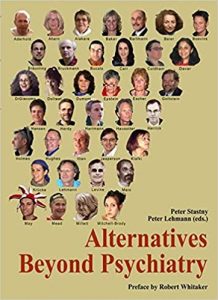‘One Step Beyond: Alternatives beyond Psychiatry’ Edited by Peter Stastny and Peter Lehmann; Book Review by Helen Spandler…

Alternatives Beyond Psychiatry is grounded in many years of work and activism within and against the mental health system. This provides its validity. Its achievement is in bringing together the shared wisdom and experience of service users, survivors and activists. The book arose out of a co-operation between Peter Lehmann, publisher in Berlin and survivor activist within the international user/survivor movement, and Peter Stastny, Associate Professor of Psychiatry at the Albert Einstein College of Medicine in New York and founding member of the International Network Toward Alternatives and Recovery (INTAR). Both have a long-standing track record of developing alternative services that negate the need for psychiatric intervention and offer autonomous paths towards recovery and self- determination.
As its title suggests, the book does indeed take us beyond a number of limited ideas and practices in mental health. First, it demonstrates how far the survivor movement and radical mental health initiatives have moved beyond ‘anti-psychiatry’. Although the various authors in this book do not completely disregard the insights of the anti-psychiatrists (and some of the authors make due reference to the work of R.D Laing et al.) their work is only informed by these critiques, i.e. they are not framed by them.
The alternatives presented not only move us beyond the potential nihilism of ‘anti-psychiatry’ and various academic critiques of psychiatry. They also take us further than the reformist strategies of the Italian Democratic Psychiatry movement, social psychiatry or community extensions of psychiatric institutions (what Robert Castel has referred to as ‘merely a form of psychiatric expansionism’). Indeed, the authors are careful not to impose any new replacement psychiatric or psychological ‘models’ or ‘techniques’. Rather, Alternatives Beyond Psychiatry prioritises new ways of living with madness and diversity, without recourse to diagnosis, psychiatrisation or undue reliance on medication.
On this count, this book could be construed as ‘anti-medication’. But that would miss the point. The mental health system in the West is heavily reliant on medication as a basis for mental health care. The authors make a compelling case that this isn’t always necessary and that there are viable alternatives. It would be more apt to say that the book is anti-coercion and pro-voluntarism and informed choice.
Alternatives Beyond Psychiatry functions as a powerful indictment of the failings of the mental health system and a rallying cry for more humane and authentic support services. It is driven by anger at a psychiatric system that is seen to invalidate people’s experiences and actually prevent recovery. But, rather than dwelling on negativity, it uses this anger to inspire and develop new forms of support infused with hope. We read of the experiences of Dorothea Buck-Zerchin (a 90 year old woman with seventy years experience of coercion in the mental health system), Kate Millet’s passionate re-instatement of the ‘myth of mental illness’, survivors’ personal accounts of how they survived, about examples of concrete working alternatives (e.g. Soteria House, the Windhorse Project, Hotel Magnus Stenbock, and the Berlin Runaway House) and various practical support tools. From around the world, it offers examples of innovative and creative ways of supporting people through mental health crises, but outside the conventional mental health system.
Yet, this book also goes well beyond ‘self help’ by offering examples of legal, community and political action to secure rights and demand alternatives (e.g. the ‘Evolving Minds’ group in the UK, PsychRights in Alaska, and the international Icarus Project). It also takes us beyond mainstream liberal ideas about ‘recovery’ and ‘social inclusion’ by rooting its ideas in the actual practices of mental health activists, users/survivors and their allies. This means that the chapters do not assume our goals should necessarily be ‘inclusion’ in mainstream society and ‘recovery’ regardless of mental illness (which at its worst translates as: ‘Keep taking your medication, get off benefits and get back to work’).
Lastly, Alternatives Beyond Psychiatry moves beyond tired academic or professionalised debates concerning the latest competing models or theories ‘about mental health’. Packed as it is with stories, information and ideas, it provides an indispensable resource for anyone concerned with improving mental health care and creating a better society.
Alternatives Beyond Psychiatry edited by Peter Stastny and Peter Lehman
Peter Lehmann Publishing, Berlin / Eugene / Shrewsbury 2007 ISBN 978-0-9788399-1-8 (GB), 978-0-9545428-1-8 (US), RRP £ 18.99
For more information: www.peter-lehmann-publishing.com
